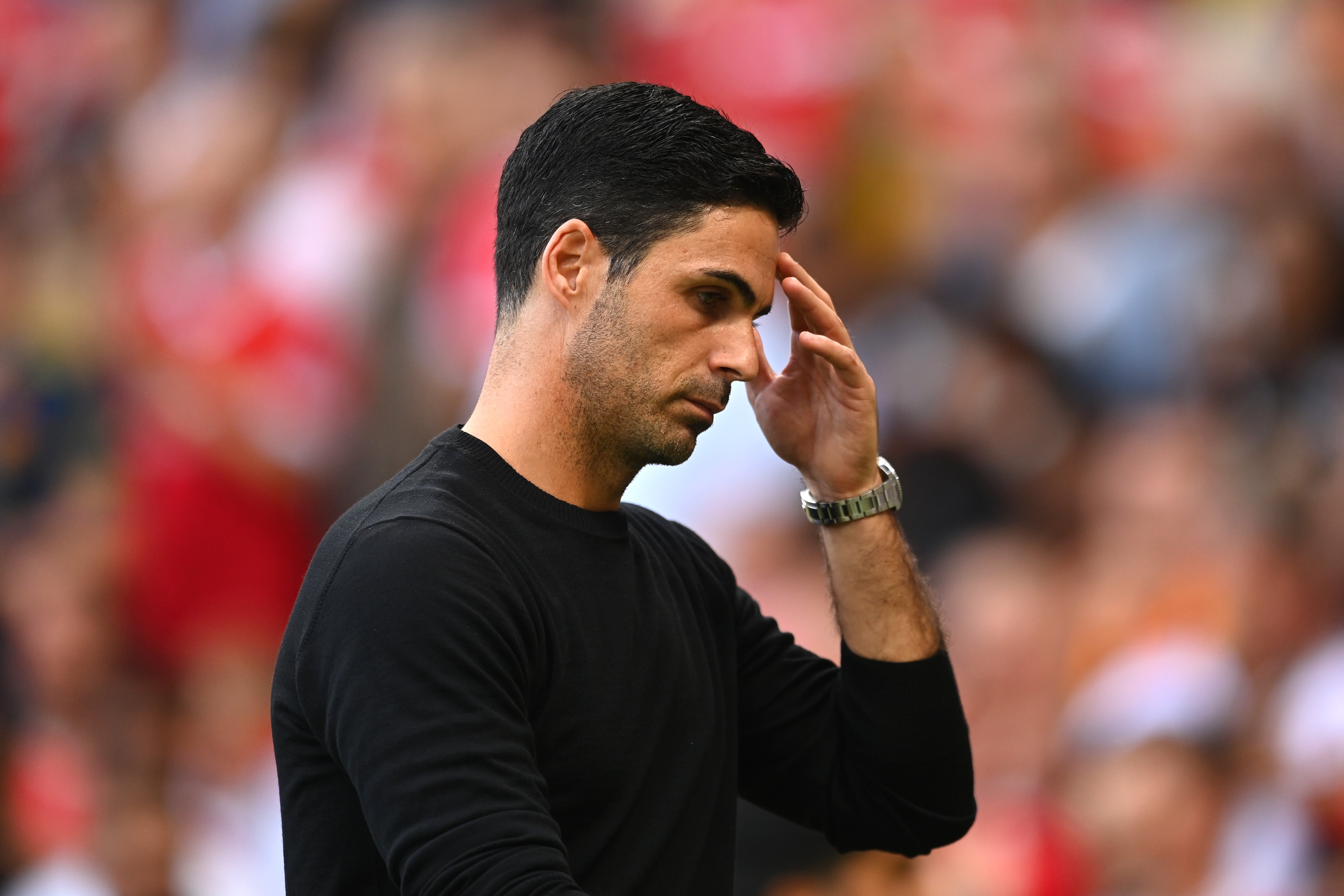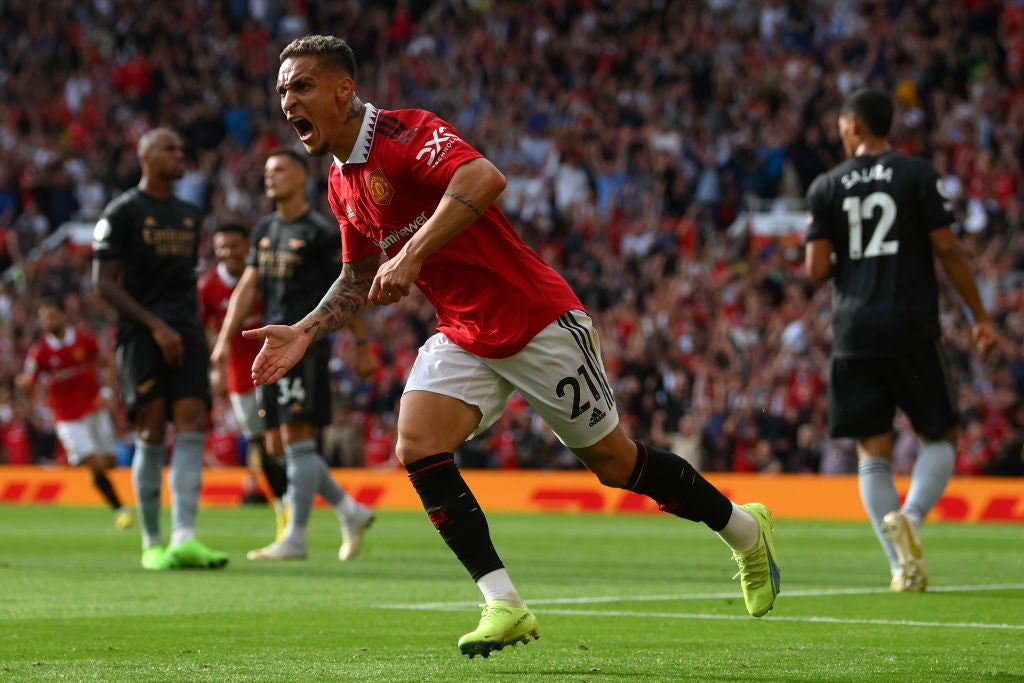Mikel Arteta craves killer instinct to complement Arsenal’s attacking ambition
The Gunners could not convert enough against Manchester United despite periods of dominance at Old Trafford

Your support helps us to tell the story
From reproductive rights to climate change to Big Tech, The Independent is on the ground when the story is developing. Whether it's investigating the financials of Elon Musk's pro-Trump PAC or producing our latest documentary, 'The A Word', which shines a light on the American women fighting for reproductive rights, we know how important it is to parse out the facts from the messaging.
At such a critical moment in US history, we need reporters on the ground. Your donation allows us to keep sending journalists to speak to both sides of the story.
The Independent is trusted by Americans across the entire political spectrum. And unlike many other quality news outlets, we choose not to lock Americans out of our reporting and analysis with paywalls. We believe quality journalism should be available to everyone, paid for by those who can afford it.
Your support makes all the difference.There was good news for an all-conquering Arsenal side at Old Trafford. Not, admittedly, the Arteta Invincibles, who lost that tag, their five-game winning start to the season giving way to defeat. But the actual Invincibles, whose uniqueness spans eras. (The “Invincibles” did of course lose to Middlesbrough in the semi-finals of the League Cup, Manchester United in the semi-finals of the FA Cup and Chelsea in the quarter-finals of the Champions League.) Only Tottenham and Manchester City are left unbeaten in the Premier League and one might be beaten when they face each other on Saturday.
But as Arsene Wenger’s class of 2004 can testify, Old Trafford can be a graveyard of dreams. They went 49 games without losing before Manchester United prevailed and pizza flew. Mikel Arteta’s modern-day league leaders won five in a row before United overcame them. A statement victory for Erik ten Hag was a result to rue for Arteta. “We should come here and win,” he said.
They are not words Arsenal have always voiced at Old Trafford. They have triumphed once in 16 league trips to United’s home. They have sometimes come north with an inferiority complex, sometimes simply with a poorer group of players. An 8-2 shellacking in 2011 prompted Wenger to sign Arteta to add experience to his midfield.
Eleven years on, Arsenal have an ambition they have only infrequently demonstrated in the intervening period. It was apparent in the performance and in their manager’s words. “I saw a very different Arsenal team,” he said, when asked to appraise United. They feel transformed but their five league wins this season have all come against possible bottom-half finishers. This was a first major test. The result suggested Arsenal failed it, much of the performance that they passed it.
There was a curt directness to Arteta’s analysis. “We had some big periods where we were totally dominant,” he said. “The game was there for the taking. We haven’t won it because we lacked some discipline in some moments and we weren’t ruthless enough in front of goal.”
He could lament two goals United scored on the counter-attack, perhaps his own overly bold triple substitution when 2-1 down, certainly the way Christian Eriksen sprang the offside trap. Perhaps, as at the end of last season, it showed a susceptibility to the break when Thomas Partey is absent. “In any moment, when they have open spaces, they are going to hurt you,” he said. Aided by the class of Eriksen, they did.
The midfield felt too open. While Manchester United had a quintuple Champions League-winning defensive midfielder on the bench for 80 minutes, in Casemiro, Arsenal had Albert Sambi Lokonga in the starting 11. Perhaps that could have been Douglas Luiz’s role had Aston Villa accepted a deadline-day bid but, after spending some £265m in the last two summers, Arteta did not plead poverty. “I am not going to make any excuses,” he said and, apart from a lament about the apparent inconsistencies of the officiating, he did not.

Certainly a high defensive line is a high-risk strategy and it might have backfired as Marcus Rashford raced away to score twice. But there was a boldness to Arteta’s blueprint, shown in the style of Martin Odegaard’s outstanding display of incisive playmaking, evidenced by the statistics that showed 47 touches in the United box and 16 shots. “We created chance after chance but did not close the game,” Arteta said. “We did not score enough.”
Gabriel Martinelli’s direct running and disallowed goal illustrated why Jurgen Klopp, for one, is such a fan. He can eviscerate defences. Bukayo Saka was terrific, even if that is scarcely surprising. Include the excellent Gabriel Jesus and the creative contingent brought the possibility of plenty of goals.
They have been too rare in Arteta’s reign. Arsenal got 56 goals in 2019-20, when he replaced Unai Emery in December, 55 and 61 in two full campaigns. They only once finished a full campaign under Wenger with as few. Last year, Arteta’s old employers at Manchester City averaged a goal a game more. That gap should be closing now. “To play the way we do [here] today, I want to see how many teams do this season,” Arteta said.
That attacking ability might have convinced him to gamble, to front-load his side with a positive triple change. “I said the game was there for the taking if we played with courage,” Arteta said. “We did: we could have scored another two or three – you have to kill the game.” Many an Arsenal side of the past has lacked that killer instinct. The oft-heard criticism is that they have had style but not substance. Arteta has added aesthetic appeal, but his unforgiving verdict shows he is demanding both.



Join our commenting forum
Join thought-provoking conversations, follow other Independent readers and see their replies
Comments